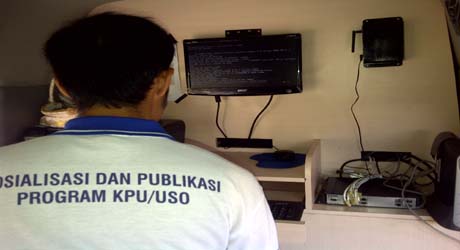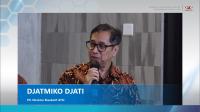Indonesia Suspend USO Program
10:46:39 | 11 Mar 2015

Ilustrasi (dok)
JAKARTA (IndoTelko) – Indonesian Ministry of Communications and Information Technology (Kemenkominfo) decided to suspend its Universal Service Obligation (USO) in order to prevent the emergence of potential losses from various aspects.
Head of Information and Public Relations of the Ministry of Communications and Information Technology Ismail Cawidu in a written statement said that based on evaluation monitoring result of USO services development, in terms of budget the actual annual average until 2014 reaches 41 percent.
"It shows the ineffectiveness of USO, therefore the USO service is temporarily halted," Ismail said.
USO is part of the government's obligation to provide universal service in telecommunications and informatics to the public. The service obligation is undertaken to reduce the digital gap especially in the rural, underdeveloped and the outermost areas, which would have an economic burden for the commercial telecommunications providers.
Currently, the USO services program begins with basic services (voice) to data services (internet) with activities consists of Desa Dering (telephone line service into villages), District Internet Service Center (PLIK) and the mobile PLIK (MPLIK).
The currently running USO service has been performed using a rental services model or other procurement services from the USO provider.
Businesses in the telecommunications sector usually convey their contribution the government to organize the USO program, which this contribution is known as the USO fund or the KPU, Public Service Obligation funds.
The amount of contribution given is usually 1.25% of the entrepreneur’s income. Besides the USO, there is other charges applied namely the Telecommunications Implementation Cost (BHP) of 0.50% which is considered as well as the State Non-Tax Revenue (PNBP). These funds are paid by the operator to the state per quarter.
Redesign
Furthermore Ismail said during the temporary suspension, the evaluation and redesign steps for the 2015 USO program. "The main essence of redesigning is to continue the existing programs but changing its mechanism, which no longer a" top down" from the central government to the regional areas, but from regional areas to the central government that are also tailored to the needs of the regions, and also based on the needs of ministries and other agencies and community groups," Ismail said. Ismail added that the future USO program will not only includes infrastructure development but also includes the development of an ecosystem such as empowerment, development of content and applications. The redesigning concept is also to be "clustering", which is in accordance with the conditions and readiness of each region. To facilitate the USO monitoring and evaluation, redesign programs also involving active participation of all stakeholders from planning, implementation and monitoring. USO program redesign is planned for completion by 2015. The government is also preparing a major design (Grand Design) of the USO program assuming that Act 36 of 1999 was replaced by the new Telecommunications Act or the Act Convergence. Among the important issues to be considered in the new legislation is the adjusted USO contribution model to the dynamics of the telecommunications and informatics industry in the development of infrastructure and ecosystems in areas that are economically disadvantaged. Payment
Meanwhile, Member of the House's Commission I Tantowi asked the government to settle the vendor’s payments who are implementing the Universal Service Obligation (USO) before executing the suspension of programs which aimed at eliminating digital gaps in the regions. "Termination of the USO services because the budget was marked by the Parliament. The budget marking reason was due to the alleged misuse of funds as happened in the District Internet Service Providers (PLIK) and Mobil District Internet Service Center (MPLIK) programs. The fault is in the government's hands as the regulator. To our knowledge, the operator has performed its obligations under the USO fund to pay to the government," Tantowi said. Tantowi added that to assist vendor's payment who has done their job according to the House's Commission I regulations will revoke the marked budget for the government to be able to make payments to the vendor. "We will suspend the PLIK and MPLIK program afterwards," Tantowi said. According to him, the misdirected USO program is not the vendor's fault who mostly becomes the victims. "Many of the vendors did not do anything wrong," Tantowi added.(es)
Baca juga :
•
•
•
Furthermore Ismail said during the temporary suspension, the evaluation and redesign steps for the 2015 USO program. "The main essence of redesigning is to continue the existing programs but changing its mechanism, which no longer a" top down" from the central government to the regional areas, but from regional areas to the central government that are also tailored to the needs of the regions, and also based on the needs of ministries and other agencies and community groups," Ismail said. Ismail added that the future USO program will not only includes infrastructure development but also includes the development of an ecosystem such as empowerment, development of content and applications. The redesigning concept is also to be "clustering", which is in accordance with the conditions and readiness of each region. To facilitate the USO monitoring and evaluation, redesign programs also involving active participation of all stakeholders from planning, implementation and monitoring. USO program redesign is planned for completion by 2015. The government is also preparing a major design (Grand Design) of the USO program assuming that Act 36 of 1999 was replaced by the new Telecommunications Act or the Act Convergence. Among the important issues to be considered in the new legislation is the adjusted USO contribution model to the dynamics of the telecommunications and informatics industry in the development of infrastructure and ecosystems in areas that are economically disadvantaged. Payment
Meanwhile, Member of the House's Commission I Tantowi asked the government to settle the vendor’s payments who are implementing the Universal Service Obligation (USO) before executing the suspension of programs which aimed at eliminating digital gaps in the regions. "Termination of the USO services because the budget was marked by the Parliament. The budget marking reason was due to the alleged misuse of funds as happened in the District Internet Service Providers (PLIK) and Mobil District Internet Service Center (MPLIK) programs. The fault is in the government's hands as the regulator. To our knowledge, the operator has performed its obligations under the USO fund to pay to the government," Tantowi said. Tantowi added that to assist vendor's payment who has done their job according to the House's Commission I regulations will revoke the marked budget for the government to be able to make payments to the vendor. "We will suspend the PLIK and MPLIK program afterwards," Tantowi said. According to him, the misdirected USO program is not the vendor's fault who mostly becomes the victims. "Many of the vendors did not do anything wrong," Tantowi added.(es)
Artikel Terkait
-
 English Ver. - 04:00:00 | 19 May 2024The real estate sector is observably shifting toward sustainability
English Ver. - 04:00:00 | 19 May 2024The real estate sector is observably shifting toward sustainability -
 English Ver. - 05:21:00 | 03 May 2024Primary drivers for IT infrastructure investments in the next year include ransomware prevention
English Ver. - 05:21:00 | 03 May 2024Primary drivers for IT infrastructure investments in the next year include ransomware prevention
Rekomendasi
Berita Pilihan
More Stories
PR Newswire



























































